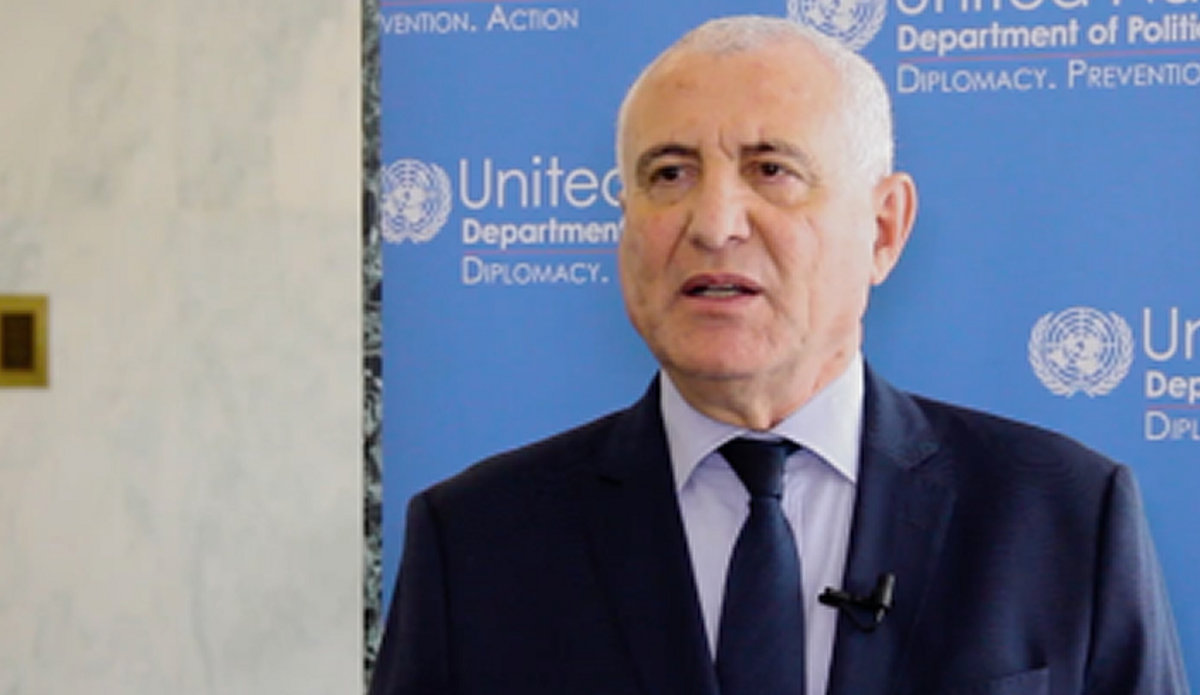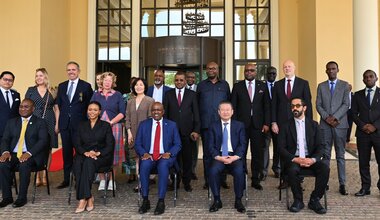Djinnit: Despite Slow Progress, Great Lakes Countries Remain Committed to Implementing Peace, Security and Cooperation Framework
Source: UN Department of Political Affairs
The Great Lakes region of Africa is among the most volatile in the world. It first registered with many people as a consequence of the genocide in Rwanda, and some of the most brutal conflicts in the last 25 years have taken place within and between some of its countries. But violence and bloodshed do not tell the whole story of the Great Lakes, even if tensions persist. Building on the gains made in peace and stability in the region in the past decade is high on the international agenda. The Special Envoy of the Secretary-General for the Great Lakes region, Said Djinnit, whom we spoke to during the General Assembly last week, has a major role to play in that regard.
In your last report on the situation in the Great Lakes region you talked about the slow progress of the implementation of the Peace, Security and Cooperation Framework for the Democratic Republic of the Congo (DRC). What are the reasons for this?
In my last report I mentioned indeed that the progress of the implementation of the Peace, Security and Cooperation Framework Agreement that was adopted by the leaders of the region in February 2013 has been rather slow for a number of reasons. And I mentioned in particular the fact that the internal dynamics have taken a lot of energies of the countries of the region and therefore have not been able to focus on some regional issues that they have undertaken to address, including the root causes of instability in the region – and I mean in particular the issue of the negative forces and the armed groups that are still creating insecurity and instability in eastern DRC with implications in the region. That’s why I referred to the slow progress.
Has there been any progress since that report?
The good news is that the countries of the region remain committed and engaged in the implementation of the Peace, Security and Cooperation Framework Agreement. A number of countries are making socio-economic progress and are still committed to pursue the path to consolidating democracy and peace, although not without setbacks, unfortunately. As you know we still have the continued situation in Burundi, where the parties have not been able to come together in the dialogue that the facilitator of the East-African Community, former [Tanzanian] President Benjamin Mkapa, is expected to promote. That’s why we are very supportive of this process.
At the same time, unfortunately, despite a number of efforts to try to get an inclusive dialogue in the DRC, we have seen recently some serious incidents of violence in the capital city and in other places in the country, which is a source of great concern. We have seen that the Secretary-General has expressed concern. We are all consulting here in New York how best we can help all the parties to really commit themselves to an inclusive dialogue that could be promoted within the context of the respect of the constitution of the DRC but also of the resolution 2277 of the Security Council.
Your mandate includes providing support for the holding of peaceful and credible elections. Several elections in the region, such as in the Central African Republic, Uganda and Tanzania, have been relatively peaceful. But elections are always a challenge to peace and security. What do you think are some of the ingredients necessary to hold peaceful, credible elections?
That’s why I was saying that there is, we always have mixed feelings because we have a sense of progress but also at the same time challenges and set-backs. That’s part of life, unfortunately. That’s part of the transition in Africa. But from the United Nations perspective, and the African Union and other international organizations, we have been encouraging Member States to remain focused on pursuing democracy and creating conditions for democratic, free and peaceful elections. There have been a number of cases where we had peaceful elections that went smoothly, but unfortunately there are cases where we are still stuck with the ongoing problems and difficulties, and I mentioned earlier the cases of Burundi and the DRC as it is now. In other places in Africa we have the issue of Gabon. But in the region of the Great Lakes we have the outstanding issues of the electoral process in Burundi and in the DRC. Burundi, you know, it’s more than one-and-a-half years of crisis following the decision of President [Pierre] Nkurunziza to stand for elections – a decision that was divisive in the country. He was ultimately elected but there was a strong opposition and the East-African community, with the support of the international community, undertook to facilitate dialogue and unfortunately we are not making too much progress. But in a recent meeting of the East-African Community the leaders endorsed the roadmap by facilitator Mkapa and it is our hope that with this renewed support from the region, the regional leaders, Mkapa, with our support of the United Nations, the African Union, the European Union and other members of the Security Council, will be able to make significant progress in the weeks to come.
On the DRC as you know, the facilitator has been appointed from the African Union whom we have been supporting. Unfortunately, dialogue has been engaged but has not been concluded yet, because of the ongoing situation. Our hope is that all the parties recommit themselves to dialogue and that the dialogue be inclusive so that you could have a consensual solution for a transition, because it’s clear that the elections cannot be held on schedule, but that the transition be as short as possible, obviously. But it should be within the parameters of the respect of the constitution and the resolution of the Security Council.
 UN
UN





